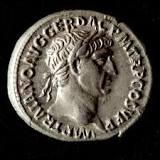No edit summary Tag: rte-source |
m (→Verses: Changing "References" heading to "Verses" to fit our new Verse Attribution, replaced: ==References== → ==Verses==) Tag: apiedit |
||
| Line 7: | Line 7: | ||
When it came time to pay the crew, the landowner paid the last first: a full denarius each! When the men that had agreed to work for a denarius screamed "foul." The landowner reminded them of their agreement, and sent them on their way with a denarius. He further reminded them that it was up to him to decide what was 'fair.' The point was that the choice of who comes into the vineyard was the owners alone. The value of each of those he chose was equal in his sight. |
When it came time to pay the crew, the landowner paid the last first: a full denarius each! When the men that had agreed to work for a denarius screamed "foul." The landowner reminded them of their agreement, and sent them on their way with a denarius. He further reminded them that it was up to him to decide what was 'fair.' The point was that the choice of who comes into the vineyard was the owners alone. The value of each of those he chose was equal in his sight. |
||
| − | == |
+ | ==Verses== |
<references/> |
<references/> |
||
[[Category:Objects]] |
[[Category:Objects]] |
||
Revision as of 21:34, 12 October 2015

Denarius
A denarius is a coin used in the Roman Empire. It is worth a person's daily wage and is used in English translations of the Bible to denote such. The King James Version uses "penny", "pence", and "pennyworth".
History
The smallest coin of the Roman coinage system after Augustus implimented reform was the copper as. The denarius was a silver coin originally representing a value of ten asses (not the animal!). By the first century AD, under these reforms, the value of a denarius had been increased to 16 asses. An as officially weighed about 3.9 grams, with a value in 2015 of about two cents ($ 0.02). This would, in absolute terms, give the denarius a value of about thirty two cents ($ 0.32).
The Day's Wage[1]
To teach a lesson about just who might be a citizen of the "kingdom of heaven," Jesus told the parable of laborers hired to harvest grapes. The owner of the vineyard went early in the morning to the local labor pool: able bodied men looking for work in the town square. He acquired their services for a denarius (KJV : 'penny'). Historians verify the veracity of this wage in the first century AD. The landowner had need of more workers throughout the day, finally even hiring men to work for just one hour.
When it came time to pay the crew, the landowner paid the last first: a full denarius each! When the men that had agreed to work for a denarius screamed "foul." The landowner reminded them of their agreement, and sent them on their way with a denarius. He further reminded them that it was up to him to decide what was 'fair.' The point was that the choice of who comes into the vineyard was the owners alone. The value of each of those he chose was equal in his sight.
